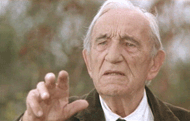Three Brothers opens to an oddly sterile medium shot of a building wall (made even colder and more impersonal by the black and white photography) as the amplified sound of a heartbeat discordantly accompanies an elegiac melody, before a jarring chromatic shift focuses the camera in extreme close-up at the center of a littered, derelict vacant lot amid a pack of rats scavenging for food. The strangely primal image serves to wake the pensive and introverted Rocco (Vittorio Mezzogiorno) from his discomforting sleep, who then subsequently opens his door to reveal the bustling sight of rambunctious, troubled adolescents in their sleeping quarters at a juvenile reformatory facility in Naples. An early morning visit from the local police seemingly reinforces his own sense of crisis over the efficacy of his selfless efforts to rescue the children entrusted to his care as their investigation into a series of petty thefts has been traced back to several unidentified young delinquents who have devised a means to scale the walls of the institute at night to sneak into town, then return to the facility unobserved by morning, and have asked Rocco for his assistance in identifying the perpetrators. The theme of protective and isolating walls carries through to the image of Rocco’s elderly father Donato (Charles Vanel) as he leaves the gates of his remote mountainside villa in southern Italy and, while walking through an open field, has a surreal encounter with his wife Catalina as she attempts to recapture an errant rabbit that had escaped from the kitchen. Donato’s subsequent arrival at a telegram office in town reveals the source of the old man’s melancholic bewilderment over the unexpected rendezvous as he initiates a series of telegrams to his grown children informing them of their mother’s death. The eldest son Raffaelle (Philippe Noiret), a successful, often publicized judge in Rome who has presided over a series of high profile cases involving organized crime and domestic terrorism, has been asked to assume yet another volatile (and consequently, potentially dangerous) case from a retiring, disillusioned judge. Weighing the entreaties of his apprehensive wife (Andréa Ferréol) to reject the proposed judicial appointment out of safety concerns with his own moral imperative to dispense law fairly in the belief that the simple (but often courageous) act of upholding justice reinforces the nation’s underlying fabric of democracy, Rafaelle seizes his unexpected trip to his ancestral home away from the familial pressures of his own wife and son as an opportunity to reflect on what could become a fatal decision. In contrast to the well-established Rafaelle, the youngest son Nicola (Michele Placido), estranged from his northern-born wife, leads a near transient life as a factory worker in Turin, constantly championing the cause of the working class by participating in worker strikes and management intimidation. Bringing along his warm and affectionate young daughter Marta (Marta Zoffoli) home for the funeral, his life has been defined by the instability of his personal and professional relationships. Brought together by tragedy, the three ideologically dissimilar brothers are compelled to reflect on their own personal direction in the gravity of their profound, shared grief.
Loosely adapted from Andrei Platonov’s novel The Third Son by Francesco Rosi and renowned screenwriter Tonino Guerra, Three Brothers is an elegantly muted, thoughtful, and provocative observation of the sociopolitical climate of 1970s Italy, as the national struggle with widespread corruption, economic disparity, organized crime, delinquency, and domestic terrorism (by the young radicals of the Red Brigade) seemed escalating and interminable. By integrating extended dream sequences into a naturalistic, social realist framework, Rosi illustrates the underlying idealism and sense of human decency that pervade the seemingly conflicting actions and divergent life calling of the three brothers as each strives to improve social conditions through dedicated service. Rosi further incorporates recurring imagery of life in the bucolic southern village through dreams and flashbacks in order to reflect a timelessness and perpetuity of Donato and Catalina’s simple, unhurried life in the country: Donato’s dissemination of the tragic news through outmoded telegrams (in the absence of a telephone in the house) that is inferred in Rocco’s memory of the delayed arrival of Allied soldiers on a lone tank into town (and into the sight of an puzzled, surrendering village) to announce the end of war; Marta’s oblivious playing at a grain storage barn that mirrors a flashback of a newly married Catalina (Simonetta Stefanelli) burying her feet in the sand on a beach and subsequently losing her wedding ring; the couple’s joyful outdoor wedding celebration despite the interruption of rain that is contrasted against constant reminders of their sons’ fractured (Nicola), voluntarily separated (Raffaelle), and nonexistent (Rocco) families. It is this sentimental incongruence that inevitably defines the seeming cultural irreconcilability between the rooted Donato and his emigrated children – an understanding of one’s humble sense of purpose within the unpredictable and disillusioning chaos of his environment – the patience to carry out the minutiae of life’s forbidding, existential task, diligently sifting through the metaphoric sands of time, to recover an irreplaceable piece of one’s soul.
© Acquarello 2004. All rights reserved.
